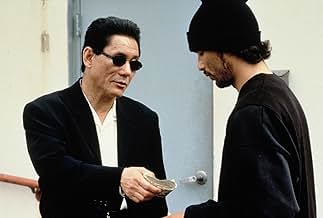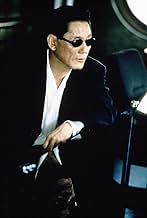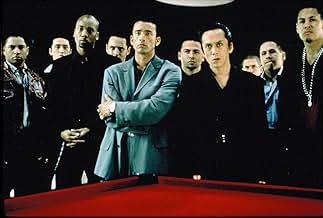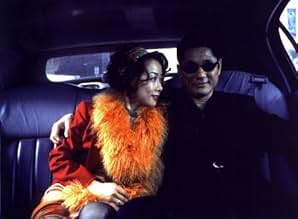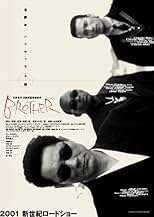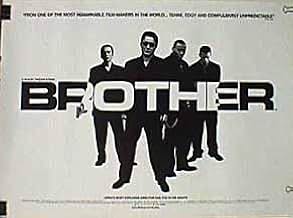AVALIAÇÃO DA IMDb
7,1/10
25 mil
SUA AVALIAÇÃO
Um gângster japonês é exilado para Los Angeles, onde seu irmão vive com uma pequena, mas respeitável gangue multirracial, que ele inspira para expandir sua influência.Um gângster japonês é exilado para Los Angeles, onde seu irmão vive com uma pequena, mas respeitável gangue multirracial, que ele inspira para expandir sua influência.Um gângster japonês é exilado para Los Angeles, onde seu irmão vive com uma pequena, mas respeitável gangue multirracial, que ele inspira para expandir sua influência.
- Prêmios
- 1 vitória e 1 indicação no total
Takeshi Kitano
- Aniki Yamamoto
- (as 'Beat' Takeshi)
Ryô Ishibashi
- Ishihara
- (as Ryo Ishibashi)
Tatyana Ali
- Latifa
- (as Tatyana M. Ali)
Avaliações em destaque
This is the 4th Kitano film I've seen recently. It has most of the characteristics of the other films - the sudden, shocking violence, the impassive silences, the same supporting actors, the obligatory seaside scene. But the shift to an American location weakens it, despite the excellent contributions of the US actors, especially Omar Epps.
But the core, unmissable qualities of a Kitano film remain. Takeshi Kitano must be the natural successor to Clint Eastwood as an anti-hero. Most of the stylised violence takes place off-screen, with a flash of humour, then the after-effects vividly on display. The sound-track from Joe Hisaishi matches the screen action perfectly, at times an aggressive supplement to the violence, at other times hauntingly peaceful.
The ending is the film's weakest part, as though Kitano pandered to imagined (or real) American requirements. The out-of-town setting and road movie elements fit uncomfortably with the rest of the film. But if this is the compromise needed to get Kitano to make more films out of Japan, it must be worthwhile.
But the core, unmissable qualities of a Kitano film remain. Takeshi Kitano must be the natural successor to Clint Eastwood as an anti-hero. Most of the stylised violence takes place off-screen, with a flash of humour, then the after-effects vividly on display. The sound-track from Joe Hisaishi matches the screen action perfectly, at times an aggressive supplement to the violence, at other times hauntingly peaceful.
The ending is the film's weakest part, as though Kitano pandered to imagined (or real) American requirements. The out-of-town setting and road movie elements fit uncomfortably with the rest of the film. But if this is the compromise needed to get Kitano to make more films out of Japan, it must be worthwhile.
As i read most of the previous comments most of us agree that this film is one of a kind. We all enjoyed it on some other level, above and beyond the regular. It shows certain characteristics that we find most interesting, honor,loyalty. Good acting, strange plot, unpredictability. I hope there are more films like this one out there, but its hard to find. I watched this movie as an accident, I hope if someone that reads this knows of another similar movie that is JUST as good or better (if thats possible), this movie has been one of those movies that I will never be able to forget, it has been 1 year since i have seen it last, and every moment sticks out clear as day. Excellent movie, great job Takeshi! Good comments everyone, well said...well thought, pros and cons.
cheers
cheers
"Brother" makes the "Godfather" trilogy look like a kindergarten Christmas production. Kitano is definitely glorifying gratuitous violence, I am sorry to say it but it's true. He's smart and chic enough to know that he could be making wonderfully poetic films for the artsy crowd but perhaps he wants to offend on purpose. However, he ends up making beautifully directed odes to brutality in which japanese contemporary society appears only as backdrop against the vicious and callous homicidal maniacs obssessed with serial killing. Here, Kitano ,expatriated in LA, quickly manages to practically wipe off entire Cholo (Chicano) mob population: dozens of bodies mowed left and right with an aide from three inept street hustlers (one of whom is his americanized half-brother)... Of course, "Brother" does have Kitano's trademark scenes even if not nearly as elaborate as those in "Sonatine" or "Fireworks": a brief long-shot scene at the beach and a GREAT roof scene with the paper airplane...LOOK, OF COURSE, FOR SOME CHOPPED FINGERS ETC.
I am perhaps rambling a little. It shows you how ambivalent my feelings about Kitano in fact are. On one hand I like him a lot and consider him a rarely gifted film maker. In fact, one of the finest. On the other hand I deeply deplore his basic premises: death and misogyny. I can't make up my mind. I keep wanting to stay away from his films and I end up seeing them one after another. A strange experience for me.
I am perhaps rambling a little. It shows you how ambivalent my feelings about Kitano in fact are. On one hand I like him a lot and consider him a rarely gifted film maker. In fact, one of the finest. On the other hand I deeply deplore his basic premises: death and misogyny. I can't make up my mind. I keep wanting to stay away from his films and I end up seeing them one after another. A strange experience for me.
I am a fan of Omar Epps ever since I seen the TV movie First Time Felon so I decided to purchase Brother on DVD. I was shocked by the great quality of the film although it is extremely violent I feel it is necessary to get across the severeness of the yakuza. I recommend this film to anyone who likes gangster movies or violent flicks. Takeski Kitano is an extremely good actor/director. I rate it 4 out of 5. I also recommend Kitano's film Sonatine.
Brother (2000) marks the English language directorial debut for Takeshi Kitano in this cross over gangster film about a deposed Yakuza living in exile on the streets of L.A. This entertaining and surprisingly fast moving picture (for a Kitano film) release date was delayed in the United States by more than a year. When it was finally released the film played mainly in Art houses and was heavily edited by the old cronies that sit on the M.P.A.A. board. It's impossible to see this movie how it was original meant to be show. Sadly, prior releases (even on video) were the same old prints that were used during it's theatrical release. Ho-hum. I recommend the director's/international version of this film. The M.P.A.A. cut lacks the punch of the original.
A+ (International)
B+ (american)
A+ (International)
B+ (american)
Você sabia?
- CuriosidadesThis was Takeshi Kitano's only American film he ever made. In an interview, Kitano said that he did not like the final result of Brother and that he regretted his "Hollywood adventure", which was supposed to bring him a wider audience. As a result, Kitano said that he had no intention of filming outside Japan again.
- Citações
Aniki Yamamoto: I understand "fucking Jap," asshole!
- Versões alternativasUS version was heavily cut for violence to be in accordance with MPAA demands for a "R" rating.
Principais escolhas
Faça login para avaliar e ver a lista de recomendações personalizadas
Detalhes
- Data de lançamento
- Países de origem
- Central de atendimento oficial
- Idiomas
- Também conhecido como
- Brother
- Locações de filme
- Empresas de produção
- Consulte mais créditos da empresa na IMDbPro
Bilheteria
- Orçamento
- US$ 10.000.000 (estimativa)
- Faturamento bruto nos EUA e Canadá
- US$ 450.594
- Fim de semana de estreia nos EUA e Canadá
- US$ 60.029
- 22 de jul. de 2001
- Faturamento bruto mundial
- US$ 15.250.594
- Tempo de duração1 hora 54 minutos
- Cor
- Mixagem de som
- Proporção
- 1.85 : 1
Contribua para esta página
Sugerir uma alteração ou adicionar conteúdo ausente

Principal brecha
What is the Hindi language plot outline for Brother - A Máfia Japonesa Yakuza em Los Angeles (2000)?
Responda

